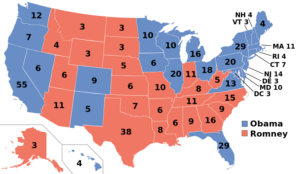 Over the weekend, NewsOK ran an editorial highlighting some of the problems of a proposal to change the way the nation handles the electoral college. Right now, many states have a system in which all its electoral college votes are handed to the winner of the statewide popular presidential vote. A proposal has been circulating, and had two bills introduced in the Oklahoma Legislature this past session, to change that to a system where each state assigns its electors to the winner of the national popular vote. In the editorial, NewsOK states that proposal would further marginalize states like Oklahoma.
Over the weekend, NewsOK ran an editorial highlighting some of the problems of a proposal to change the way the nation handles the electoral college. Right now, many states have a system in which all its electoral college votes are handed to the winner of the statewide popular presidential vote. A proposal has been circulating, and had two bills introduced in the Oklahoma Legislature this past session, to change that to a system where each state assigns its electors to the winner of the national popular vote. In the editorial, NewsOK states that proposal would further marginalize states like Oklahoma.
The influence of voters in rural states like Oklahoma would be minimized; the clout of voters in some major population centers — and the political machines often associated with those cities — would be enhanced. Based on history, this hardly seems a recipe for good government.
The National Popular Vote plan might remove Oklahoma from the category of states paid little attention to in presidential elections because the outcome is a foregone conclusion. No Democratic nominee since Lyndon Johnson in 1964 has been awarded the state’s Electoral College votes. In theory, the plan would increase interest in Oklahoma as candidates seek to boost their nationwide totals any way they can.
The truth is that yes, Oklahoma would be further marginalized by Presidential candidates in the event of a national popular vote. However, that wouldn’t be changing much from the current situation. As NewsOK states, Oklahoma has been pretty much a Presidential flyover state since the 60s.
But what can be done about the electoral college to make it more meaningful state to state and reduce the marginalization of states like Oklahoma? There are several proposals that would hopefully remedy that.
This past legislative session, a bill was introduced that would have changed Oklahoma from a winner take all state to a system where each US Congressional district elected one elector and two electors were chosen from the statewide popular vote. In this situation, there would essentially be 6 different countings of the presidential vote, once for each congressional district and once for the entire state. On the voter side, nothing would change. The voter would still be presented with the candidates running for President, Vice President and the list of electors, the proposal would merely be on the accounting side.
This proposal also has its flaws. The biggest flaw is that it is open to gerrymandering, or the redrawing of district boundaries to favor a specific candidate or party. As we see in Oklahoma, each district heavily favors its Republican Congressional candidates, despite Democratic candidates receiving over 30% of the vote in most cases.
A preferable, and potentially one of the best systems, of selecting presidential electors is to choose them based on proportional votes cast. In this case, rather than a winner take all or a district wide vote, electors would be selected based on the proportion of the votes cast in the election. In the 2012 election, President Obama received 33.2% of the vote and Mitt Romney received 66.8% of the vote. Under proportional selection, Obama would have received 2 electoral votes and Romney would have received 5.
This system also has the added benefit of reducing the marginalization of alternative candidates as well. In a winner take all system, such candidates cannot rack up electoral votes even if they receive a significant number of votes. They would have to actually win a statewide popular vote, something alternative candidates have been unable to do in many decades. For example, in the 1996 election, Reform candidate Ross Perot was able to earn 10.86% of Oklahoma’s popular vote. Had Oklahoma had a proportional system of selecting electors, he would have been able to win 1 of Oklahoma’s 8 electoral votes. While he may not have been able to win the over all election, it would have been a huge victory in winning public support for the Reform party.
But regardless of proposed changes, both establishment parties have much to gain by keeping the current system. Neither party would have much to lose if enough states switched to a national popular vote or a congressional district system. But both would have a lot to lose by a switch to a proportional system, which would explain why it never receives any traction in state legislatures.






